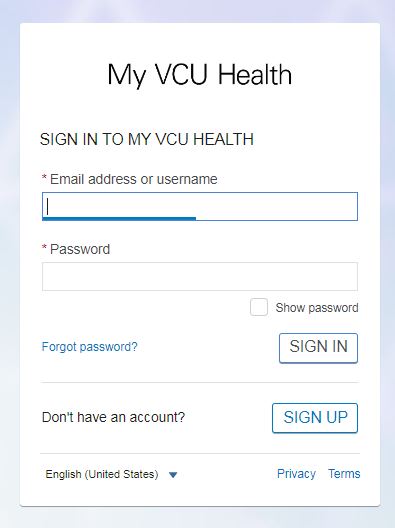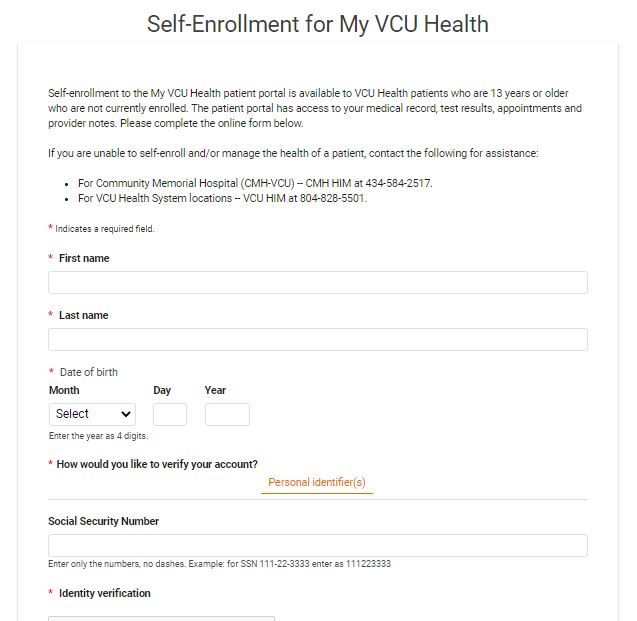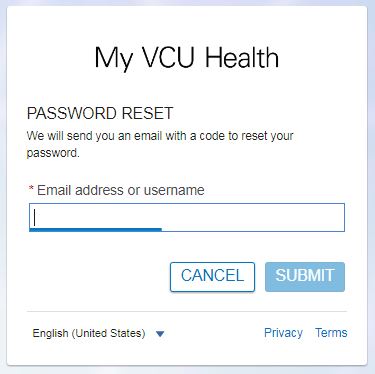Are you Looking for the VCU Patient Portal? If you want to access the VCU Patient Portal Official webpage then here you can see the official VCU Patient Portal link. You can access all your details by entering your credentials.
Even if you don’t have an account you can see step by step guide for creating a VCU Patient Portal Account and Resetting the VCU Patient Portal password as well.
VCU Patient Portal Login
- Go to the VCU Patient Portal Official Page on the Official Website

- Enter Your Username and Password as You can see in the screenshot also.
- Enter the password created for the VCU Patient Portal and press the login button.
- Now You can Access your Portal and Check Your Records
If You don’t have an account for VCU Patient Portal then create a new one using the link given below.
How To Create a VCU Patient Portal Account?
» ➤ Go to the ∗ Official Website

» ➤ Click on Sign Up/Register/ Create Account
» ➤ Enter Required Details Email, Phone Number, and whatever is required.
after filling You all the details that are required and later you can access the portal and manage your all records on the Patient Portal.
How To Forgot Your VCU Patient Portal Password
- Go to the VCU Patient Portal Page at the Official Website

- Click on the VCU Patient Portal forgot password/reset password link given below
Forgot Password/Reset Password
- Enter required details like email ID or User Name
- Check Your email for Reset Link and OTP
- Follow the next step click on the links that you received and create a new password.
If you have any queries or doubts you can also contact VCU Patient Portal via mail or phone at the number Listed Below:
Features and Functionality of the VCU Patient Portal
The VCU Patient Portal offers a wide range of features and functionality to enhance the patient experience. Some key features include:
- Appointment Scheduling: Patients can request, reschedule, or cancel appointments online, saving time and effort.
- Test Results and Medical Records: Access to lab results, radiology reports, discharge summaries, and other medical records enables patients to stay informed about their health status.
- Secure Messaging: Patients can communicate with their healthcare providers securely, asking questions, seeking clarification, or discussing concerns.
- Billing and Payments: The portal allows patients to view and pay their bills conveniently, reducing the need for paper statements and manual transactions.
- Educational Resources: Access to a vast library of patient education materials empowers individuals to learn about various health conditions, treatments, and preventive measures.
Contact Us
Emergency
If you have a medical emergency, call 911 immediately or go to the nearest hospital.
Important Phone Numbers for VCU Patients
General Information
(804) 828-9000
Appointments
(804) 828-7929 or toll-free (800) 762-6161, weekdays from 8 a.m. to 5 p.m.
Conclusion
The VCU Patient Portal offers patients a convenient and secure way to access their healthcare information.
With features like appointment scheduling, test result access, secure messaging, and educational resources, patients can actively engage in their care and stay informed about their health.
By embracing the VCU Patient Portal, patients can experience enhanced convenience, streamlined communication, and improved overall healthcare experiences.
Check More: patient-health-portal.com
FAQs
To access the VCU Patient Portal, go to the VCU Health website and select the location where you receive care. You will then be directed to the appropriate patient portal where you can log in using your username and password.
On the VCU Patient Portal, you can view your medical records, communicate with your healthcare providers, view test results, schedule appointments, and request prescription refills.
Yes, there is a mobile app for the VCU Patient Portal called MyChart. The app is available for free download on the Apple App Store and Google Play.
Yes, you can pay your medical bills on the VCU Patient Portal.
Yes, the VCU Patient Portal is secure and uses encryption to protect your personal and medical information.
Yes, you can use the VCU Patient Portal to view your test results and other medical records.
Yes, you can use the VCU Patient Portal to request prescription refills from your healthcare provider.
Yes, you can use the VCU Patient Portal to schedule appointments with your healthcare provider.
No, there is no cost to use the VCU Patient Portal. It is a free service provided by VCU Health to its patients.
